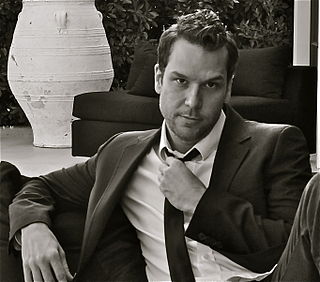A Quote by William James
Individuality is founded in feeling; and the recesses of feeling, the darker, blinder strata of character, are the only places in the world in which we catch real fact in the making, and directly perceive how events happen, and how work is actually done.
Related Quotes
o matter how much research you do, or invention you do, whether it's a character from a novel, a completely invented character or someone who actually existed, it's a work of faction. By the very fact you only have an hour and a half or two hours to tell a story, you're telescoping events and it is, in the end, a work of imagination.
Feeling different, feeling alienated, feeling persecuted, feeling that the only way to deal with the world is to laugh - because if you don't laugh you're going to cry and never stop crying - that's probably what's responsible for the Jews having developed such a great sense of humor. The people who had the greatest reason to weep, learned more than anyone else how to laugh.
I nod, thinking of how difficult marriage can be, how much effort is required to sustain a feeling between two people - a feeling that you can't imagine will ever fade in the beginning when everything comes so easily. I think of how each person in a marriage owes it to the other to find individual happiness, even in a shared life. That is the only real way to grow together, instead of apart.
Comedy crowds - we always want to come out and ask you, 'How you feeling?' We always say that, 'By a round of applause, how do you feel?' Right? 'By a round of applause, how you feeling?' It's the only place in the world that you judge how you're feeling by a round of applause... There's never like a car accident, people all over the ground, people running over - 'Ma'am! Ma'am! By a round of applause, how do you feel? By a round of applause - she's not clapping!
A work of art... is not a living thing... that walks or runs. But the making of a life. That which gives you a reaction. To some it is the wonder of man's fingers. To some it is the wonder of the mind. To some it is the wonder of technique. And to some it is how real it is. To some, how transcendent it is. Like the 5th Symphony, it presents itself with a feeling that you know it, if you have heard it once.
Every American wants MORE & MORE of the world and why not, you only live once. But the mistake made in America is persons accumulate more & more dead matter, machinery, possessions & rugs & fact information at the expense of what really counts as more: feeling, good feeling, sex feeling, tenderness feeling, mutual feeling. You own twice as much rug if you're twice as aware of the rug.
The lucidity of the battle narratives, the vigor of the prose, the strong feeling for the men from generals to privates who did the fighting, are all controlled by a constant sense of how it happened and what it was all about. Foote has the novelist's feeling for character and situation, without losing the historian's scrupulous regard for recorded fact. The Civil War is likely to stand unequalled.
I began to ask two questions while I was reading a book that excited me: not only what was going to happen next, but how is this done? How is it that these words on the page make me feel the way I'm feeling? This is the line of inquiry that I think happens in a child's mind, without him even knowing he has aspirations as a writer.









































